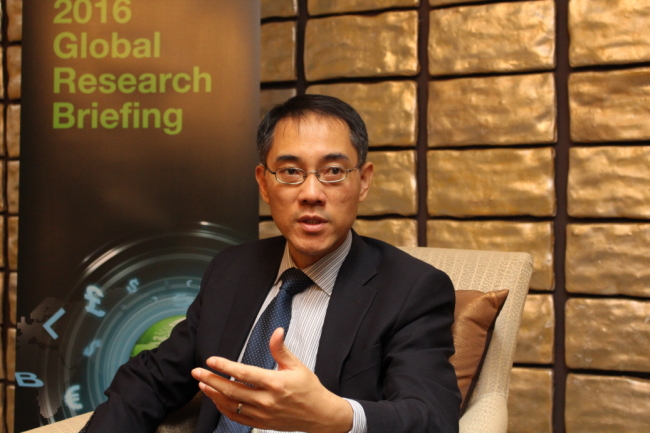[Herald Interview] Hard landing unlikely for China: SC Bank economist
By Korea HeraldPublished : Feb. 1, 2016 - 21:00
It would be an understatement to say China is off to a rocky start this year.
The stock market in the world’s second-largest economy has been suffering weeks of volatility and downbeat sentiment as fears continue to grow over its overall stability.
China’s economic growth rate slowed to a 25-year low of 6.9 percent in 2015. Many economists believe the actual growth rate -- something the Chinese authorities may be shielding from the international community -- was probably even lower.
In the words of billionaire George Soros, the Chinese economy is heading for a “hard landing,” and that in turn, is expected to contribute to a global deflation.
But some pundits, including Ding Shuang, chief China economist at Standard Chartered Bank, beg to differ.
The stock market in the world’s second-largest economy has been suffering weeks of volatility and downbeat sentiment as fears continue to grow over its overall stability.
China’s economic growth rate slowed to a 25-year low of 6.9 percent in 2015. Many economists believe the actual growth rate -- something the Chinese authorities may be shielding from the international community -- was probably even lower.
In the words of billionaire George Soros, the Chinese economy is heading for a “hard landing,” and that in turn, is expected to contribute to a global deflation.
But some pundits, including Ding Shuang, chief China economist at Standard Chartered Bank, beg to differ.

According to Shuang, China’s GDP will grow 6.8 percent in 2016 to surpass the forecast consensus of 6.5 percent.
“Let’s say we are less pessimistic than market consensus which only sees downside risks. … We try to be less affected by the sentiment at the moment and try to look at the fundamentals,” he said during an interview with The Korea Herald last Thursday in Seoul.
Shuang believes the probability of a hard landing will be quite low. “(There is a) 5 percent (chance) or lower that China will be caught in a hard-landing.”
He expects more supportive government policies to emerge, and for consumption and service sectors such as entertainment, tourism, wealth management and health care to drive the country’s growth this year.
“Consumption will contribute to 4 percentage points of the (GDP) growth which means China only needs to find another 2-3 percentage of growth from investments and exports,” the analyst said.
“Some people think that China has completed its development but there’s still room for investment in infrastructure like highway and railway network, even in Beijing and Shanghai.”
According to Reuters, Chinese policymakers are likely to set their country’s target economic growth rate in the range of 6.5-7 percent this year.
“Because the government is taking its growth target very seriously, they will mobilize resources to achieve the goal,” said Shuang, who spent a decade at the International Monetary Fund in Washington D.C. before joining SC Bank last year.
Amid a shift toward consumer-led growth from its manufacturing roots, the world’s No.2 economy has been attempting to curb overcapacity and trim excess labor in industries such as coal and steel.
According to the economist, China will shift toward a more expansionary fiscal policy in the future -- one that includes tax cuts and a bigger budget deficit amounting to about 3.3 percent of the overall GDP.
To ensure adequate liquidity, the central bank will need to cut the reserve requirements ratio by a total of 2.0–2.5 percent points by the end of this year, he predicted.
“They just want to avoid the use of an RRR cut because the market may see the move as a loose monetary policy which could put further pressure on the exchange rate. … But we think that eventually an RRR cut is the right tool to deal with the liquidity decline,” he said.
By Park Han-na (hnpark@heraldcorp.com)
-
Articles by Korea Herald







![[KH Explains] Hyundai's full hybrid edge to pay off amid slow transition to pure EVs](http://res.heraldm.com/phpwas/restmb_idxmake.php?idx=644&simg=/content/image/2024/04/18/20240418050645_0.jpg&u=20240419100350)







![[From the Scene] Monks, Buddhists hail return of remains of Buddhas](http://res.heraldm.com/phpwas/restmb_idxmake.php?idx=652&simg=/content/image/2024/04/19/20240419050617_0.jpg&u=20240419175937)

![[KH Explains] Hyundai's full hybrid edge to pay off amid slow transition to pure EVs](http://res.heraldm.com/phpwas/restmb_idxmake.php?idx=652&simg=/content/image/2024/04/18/20240418050645_0.jpg&u=20240419100350)

![[Today’s K-pop] Illit drops debut single remix](http://res.heraldm.com/phpwas/restmb_idxmake.php?idx=642&simg=/content/image/2024/04/19/20240419050612_0.jpg&u=)